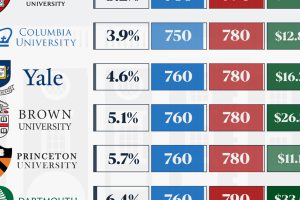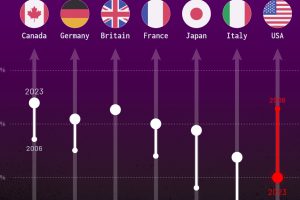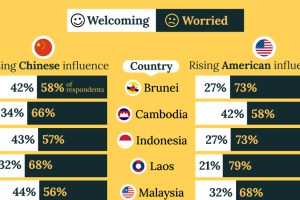Which news sources are the most trustworthy?
This seems like a simple question – but in the “fake news” era, things haven’t been so straightforward. As a result, the public’s level of trust in mass media has fallen to a low of just 32%.
Examining The Trust Spectrum
A new survey by the Trusting News Project helps shed more light on the state of trust in media, revealing the attitudes of 8,728 people in the United States. Administered through 28 media outlets around the country, the survey asked respondents how trusting they are of the media, whether they financially support news organizations, and which outlets are the most (and least) trustworthy.
Here are results to the question about trustworthiness of specific news sources:

Before we dive into the results, it’s worth noting that respondents were self-selected and tend to skew to the liberal side of the political spectrum. More on this later in the post, but keep it in mind.
High Trust, Low Trust
According to the survey respondents, The Economist is the most trustworthy news source in media.
On the far opposite side of the spectrum? It’s Occupy Democrats, an extreme left advocacy group that claims to be the “new counterbalance to the Republican Tea Party”.
Interestingly, both The Economist and Occupy Democrats have close to the same amount of Facebook likes (8.2 million vs. 6.7 million), which shows that despite polar opposite perceptions, people are willing to grant an audience to both groups.
Also scoring well for trust included outlets such as Reuters, NPR, The Wall Street Journal, Politico, and The Guardian. Meanwhile, bad trust scores went to Buzzfeed, Breitbart, Infowars, Yahoo, and The Huffington Post.
Trust By Political Skew
It’s also worth breaking down respondents into groups based on political orientation, to see what differences this can point out regarding trust and the level of financial support being provided to news organizations.
On the following graph, the X-axis shows age groups, while the Y-axis shows levels of trust (higher is more), as well as the number of news organizations respondents claim to financially support (higher is more).

For people that identify as liberals or moderates, trust of news outlets is positively correlated with age. Interestingly, for conservatives, trust in media starts low and seems to decrease with age.
Audience Biases
As mentioned earlier, although the sample size was big (>8,000), there are a few biases worth noting:
- Survey respondents were not randomly selected, and voluntarily filled out the survey.
- Survey respondents tended to be geographically near the 28 newsrooms, many of which were local, that made the survey available on their websites.
- In terms of political orientation, the audience skews towards liberals. (See below diagram).

And while the audience may not be fully representative of the American public, the survey definitely does provide interesting insight on trust in media. Get access to the full report by clicking here.





